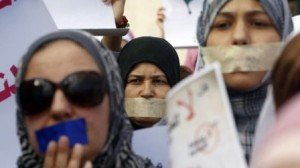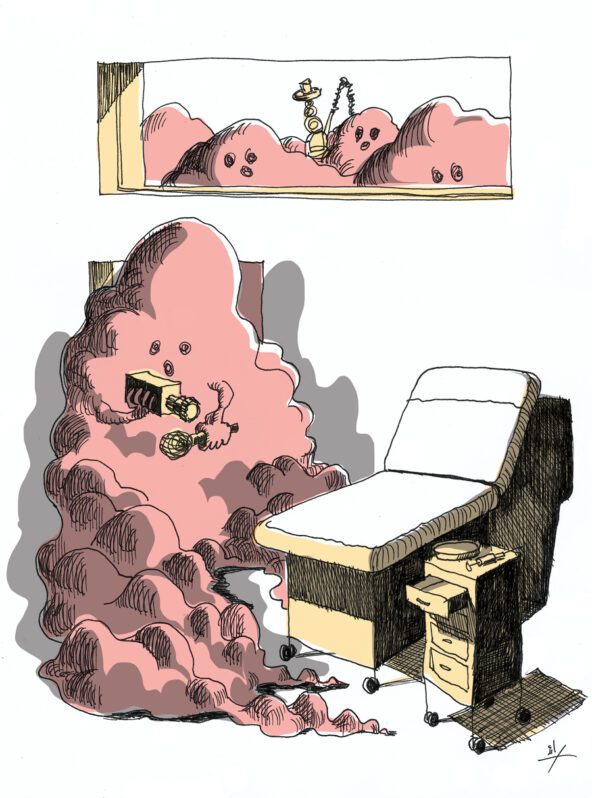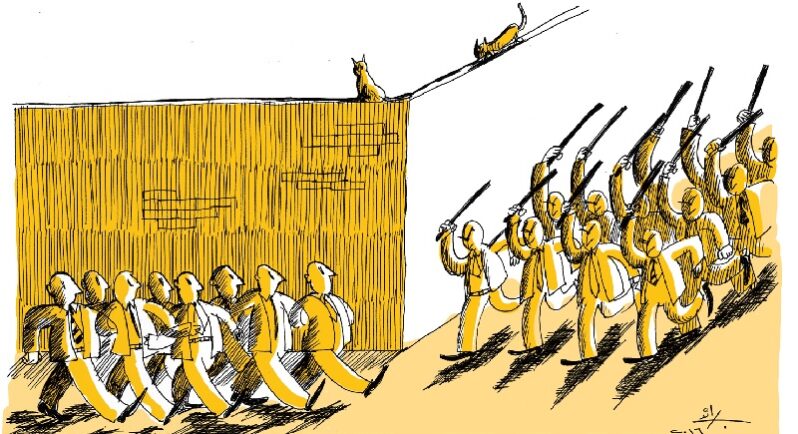Victims of Sexual Violence in Libya: Assessing Protection Mechanisms

1. Introduction
After the beginning of the armed conflict in Libya in 2011, discussion about sexual assaults –discussion that was previously taboo– began surfacing.[1] The phenomenon emerged in public in Tunisia, where Libyan families had emigrated because of the war. A group of Libyan jurists noticed that those who had fled from Libya included victims of sexual violence, and that these victims were suffering from related health,[2] social,[3] financial,[4] and even administrative[5] problems.
In early 2013, after the subsiding of the armed conflict and the success of the first legislative elections, Minister of Justice Salah Marghani developed a bill for battered women and rape victims. Its articles were based on two matters:
The wishes of victims that they directly expressed when asked about their needs from the state; and
The privileges stipulated in Article 3 of Law No. 4 of 2013 (“On Stipulating Some Provisions For Causalities of the War of Liberation With Chronic Handicaps”).[6] The bill’s drafters decided that the victims of sexual assault must be given the same treatment that the state had stipulated for persons wounded in the war.
In May 2013, after the Ministry of Justice’s bill was presented to the legislative branch (the General National Congress), congress members refused to adopt it in an attempt to deny the violations. They justified their position on the basis that the law conflicts with society’s values and the true religion of the Libyan people, which commands that such incidents be covered up, and on the basis that the law, if adopted, will open the door for some delinquent women to claim that they were raped because of their stances towards the former regime. Some members stipulated that the victims must come in person to one of the General National Congress’ sessions to request the law’s issuance so that their allegations could be verified. Of course, consenting to this condition was impossible because it conflicts with the principle of confidentiality employed to gain the trust of victims.[7]
Because the council of ministers understood the importance of the bill and the sincerity of the underlying cause, it chose to adopt the bill in the form of a ministerial decree (Decree No. 119 of 2014, “On Addressing the Circumstances of Victims of Sexual Violence”). This decree clearly revealed a discrepancy in the legislative policies of the legislative and executive branches at the time of the bill’s proposal, namely, in 2013 and 2014. Parliament was following a policy that adopted the traditional concept of values that favor silence and avoid reference to the sexual violations suffered by Libyan women during the armed conflict. This was done in the name of preserving public morals and public, order as well as respecting the traditions and customs relating to such incidents.
In contrast, the government adopted a progressive-leaning policy that employed a modern concept of values: the victim has a right to attain society’s recognition of the violation to which she was subjected, and to secure an apology from society in the form of an attempt to compensate her for the harm suffered. An apology of this kind is, from the perspective of this policy, a precondition for national reconciliation, restoring ties, strengthening social peace, and laying the foundations for the state of rights and the rule of law.[8]
It should be acknowledged that the bill is unprecedented on both the regional and international levels, and paves the way for an important step along the path of transitional justice.
First: the Civil Protection that the Bill Guarantees Victims of Sexual Violence
The basis of the bill is a set of financially-tied privileges.[9] These privileges include a monthly grant, health insurance, priority in appointment [to public service jobs], priority in obtaining home loans, opportunities for training and academic qualification, and for study within Libya and abroad, as well as annual quotas in Hajj [Muslim pilgrimage to Mecca].
Some of these grants may be necessary to redress the harm done to the victims and help them begin new, dignified lives. However, some of the privileges do little to help achieve the law’s purpose, and could be dispensed of to lighten the state’s financial burdens.
Similarly, the law did not attempt to establish a supportive infrastructure of psychological and social care for the victims. Such an infrastructure could involve training doctors and psychologists in treating victims of this sort. Following up on the psychological state and social situation of the victim and her family is extremely important. In a largely conservative society such as Libya’s, a rape victim pays the price twice: she pays once upon the failure to protect her and pays again when she herself is held accountable for the inhumane violation she suffered. The law also made no reference to the establishment of charitable organizations, and civil society institutions shoulder the responsibility of providing material and moral support to these victims.
Second: the Penal Protection that the Bill Guarantees Victims of Sexual Violence
The list of privileges for victims ended with a single tentative reference to helping rape victims legally pursue the perpetrators and put them on trial. Libyan non-government organizations have attempted to collect evidence implicating the prime minister of the former regime, Baghdadi Mahmudi, in the violations experienced by a number of Libyan women during the armed conflict. Libya’s public prosecutor also sent the investigation dossier to the Tunisian judiciary on the basis of this evidence and the accompanying inferences.[10] Even though it is difficult to determine the number of rape cases that occurred during the war, the investigation in this area is occurring in secret and no names were mentioned in the material referred to Libya’s public prosecutor. Many Libyan civil society organizations active in social affairs also claim to possess medical reports confirming that the former regime incited rape. Imprisoned soldiers of Gaddafi’s army have acknowledged this incitement.[11]
The Libyan Criminal Code contains no text clearly referencing sexual violence in wartime. Article 407 merely stipulates the crime of “carnal connection” and does not include a temporal condition. It bases the magnitude of the punishment on the use of force or presence of consent in the crime.
This text appears unsuited to the incidents at hand for a number of reasons. The actus rea does not precisely apply because the acts were committed during wartime. Similarly, the mens rea does not precisely apply because these immoral acts were committed for a specific criminal purpose, namely, to defeat the enemy and win the battle. Furthermore, the punishment is inadequate and disproportionate to the gravity of the crime. The punishment does not exceed ten years of imprisonment, except in specific aggravating circumstances that do not include perpetration during wartime.
2. The Extent of the Ministerial Decree’s Sufficiency and Effectiveness
The bill was finally issued as a ministerial decree. The Preamble of the bill expressed its goal: to perform the “necessary redress for the atrocities committed during Gaddafi’s dark reign and during the War of Liberation and redress the consequences of those atrocities”, and to recognize “victims of injustice who have not received any right to care on par with other groups.”
However, the statement of recognition of the victims remains inadequate given the refusal of the legislative authority representing the people to adopt the bill. Although the ministerial decree is important, it remains flawed because of the usurpation of legislative authority. That the administration issued the decree renders it completely worthless. Its subject matter -which relates to citizens, their rights and duties, and their dignity- does not in any way fall within the jurisdiction of the administrative function. The decree also contains financial obligations shouldered by the public treasury, which should be regulated by legislative work. For the executive authority to regulate any topic beyond the scope of autonomous regulations concerning public utilities and administrative control, is a violation of the constitutional principles stipulated in the Constitutional Declaration issued by the National Transitional Council on August 3, 2011.[12]
3. The Decree’s Future
Assessing the outlook of the law addressing the victims of sexual violence may require us to observe the current situation. It can be said that the ministerial decree enabled the executive power to take executive action, both externally by requesting and receiving international advice and support,[13] and domestically by issuing executive decrees to implement the law. It has been agreed that a statistical database will be established for information on the women covered by the ministerial decree. On an implementary and financial level, the minister of justice issued Decree No. 904 of 2014, which regulates the fund for addressing cases of sexual violence. The fund is currently supervised by the Ministry of Justice but will be transferred to the Ministry of Social Affairs (Article 5 of the aforementioned decree). The fund’s accounts have been opened, and the financing of the fund will begin with an endowment from the Ministry of Justice.[14]
However, the key question is: will the legal basis rise to the level of legislation issued by the representative of the people, namely the legislative branch, which has the original jurisdiction to legislate? In this regard, we can currently perceive optimism among some members of both Libya’s executive and legislative branches about their ability to unify the two branches’ legislative policy. The Ministry of Justice is optimistic about the future of this bill and the prospect of it being reintroduced to Parliament so that it may be passed as a law. As for the legislative branch, some female MPs have said that they submitted a recommendation calling for the adoption of the law on victims of sexual violence to Parliament’s presidency. More than fifty MPs signed this recommendation.
My own view may be more pessimistic: I see the decree as a product of temporal, spatial, and security-related circumstances that differ from the current circumstances, which preclude any hope of it being proposed again. The legislative branch is in Libya’s eastern region, where cases of sexual assault victims have not been documented. The time that has passed since the events of February 2011, in addition to the political events, security unrest, and the danger of terrorism that is prevailing throughout the country, must also be taken into account. In light of all these considerations, adopting this ministerial decree as a law is not on the Libyan legislature’s list of priorities at the moment.
This article is an edited translation from Arabic.
__________
[1] In the report on sexual violence connected to armed struggles in 2014 that Ban Ki-moon submitted to the Security Council on April 15, 2015, he mentioned the Arab states where sexual violence occurred: Yemen, Libya, Syria, Iraq, Sudan, and Somalia.
[2] Miscarriage, hemorrhaging, and other severe physical afflictions.
[3] Divorce for married women and abandonment for girls.
[4] Lack of housing resulting from the flight, or the expulsion of the family.
[5] The absence of identity papers, either because they fled without these papers, or because they chose not to present the papers in order to conceal themselves.
[6] The Official Journal, Issue No. 5, second year, March 21, 2013, page 246.
[7] Written statement by former General National Congress member Giuma Ahmed Atigha, presented to me on June 22, 2015.
[8] See; Najib al-Hasadi’s, “Separating Value Concepts” in Values Survey, Research and Consulting Center Publications, 2015.
[9] Article 3 of the bill.
[10] Mahmudi was previously imprisoned in Tunisia and accused of crossing the border illegally. He was exonerated by the Tozeur Court on February 13, 2012.
[11] This appeared in the report by Naima Misrati dated July 18, 2013 and published on the Libya Almostakbal website; http://www.libya-al-mostakbal.org.
[12] See: Isam Ali al-Dibs’s, “The Impact of Determining the Legal Nature of Autonomous Regulations on Judicial Review of Their Legitimacy”, Baghdad College of Economic Sciences Journal, Issue No. 25, 2015, page 279 and beyond.
[13] United Nations, General Assembly, Human Rights Council, Session 28, Agenda Items 2 and 10, Annual Report of the UN High Commissioner for Human Rights.
[14] Deputy Minister of Justice for human rights in an interview I conducted with her on June 1, 2015.



